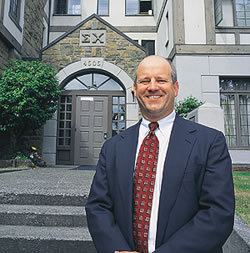The Greek system has been part of UW student life for more than 100 years, but do today's fraternities and sororities prepare undergraduates to be the leaders of tomorrow, or do the chapters function at the level of "Animal House"? As a companion to our tour of greek row, two alumni debate the value of fraternities and sororities.

|

|
|

My pride in being a member of a fraternity at the University of Washington—and my continuing membership as an alumnus these past 20 years—is a result of my association with some of the finest people I have ever met. They are the undergraduates, the young alumni and the seasoned veterans of the fraternal experience who make the bonds of our brotherhood so valuable to those who truly embrace all it has to offer. I joined a fraternity at the University of Washington in 1978 as a junior transfer student from a small school in Colorado. I was looking for a new home and new friends in a big city at one of America's largest universities. I found all of this at Sigma Chi. I joined the chapter at a time of great change. It was a time when being a part of something "traditional" was not acceptable—a time when making a commitment to an organization rather than your own personal desires was not the norm. At our chapter, the student leaders and alumni advisers provided us an opportunity to grow and learn—beyond what we gleaned from our classes—in exchange for our commitment to our chapter. The '70s provided a lot of opportunities to test the mettle of our leaders and the cohesiveness of our chapter. But whether it was issues related to inappropriate behavior or undertaking our new commitment to community service and scholarship, our leaders and advisers proved their worth—and our members remained true to our shared values. We were proud to become members of a fraternity that was led by energetic young men who sought to give value to the fraternity experience. One such member was our chapter president, Mark Stanley. Mark not only served as our chapter president but also served as ASUW vice president of governance and led the ASUW Experimental College. One of Mark's goals was for every one of the approximately 80 members of Sigma Chi to participate in at least one community service project. We reached this goal and then some.
|
Animal House was a hilarious movie but like most great comedies, there was truth behind the humor. When John Belushi's Bluto Blatarsky announced his sage words of frat wisdom to new pledges—"My advice to you is to start drinking heavily"—the scriptwriters acknowledged what has long been the sad reality of the Greek system. Fraternities are, for all practical purposes, not much more than organized saloons. Located conveniently near campus, they are places where underage classmen can be guaranteed a steady supply of alcohol. Anyone who argues otherwise is ignoring the larger truth to plead a smaller point. Current fraternity members—and certainly their alumni—usually cite fellowship between members, relationships that last beyond college, and numerous charity drives for worthy causes as the center of Greek life. But fellowship is not something the fraternities have a patent on—I found lifelong friends in the halls of McCarty Hall. To speak of brotherhood as the driving force behind the Greek system is to ignore the reality that those sylvan ideals have long ago been supplanted by partying. Even the most ardent defender of fraternities would find themselves hard pressed to pick any answer other than "drinking" if they were ever facing a Family Feud game board that asked "Name the one thing that goes on in every frat house." The second answer would be "hazing," which goes hand-in-hand with drinking. A recent book on fraternity initiation rituals includes an appendix with the names of 200 young men who died in hazing rituals during the last century. "When these people die," argues Hank Nuwer, author of Wrongs of Passage, "they are known by their last drink. They die as drunkards—ignoble deaths."
|
- Return to September 2001 Table of Contents
 The closest I ever came to joining a fraternity was buying a T-shirt for the movie National Lampoon's Animal House. The shirt sported a slogan that summed up the attitude of entitlement held by every frat member I encountered at the University of Washington: "We're college students—we can do anything we want."
The closest I ever came to joining a fraternity was buying a T-shirt for the movie National Lampoon's Animal House. The shirt sported a slogan that summed up the attitude of entitlement held by every frat member I encountered at the University of Washington: "We're college students—we can do anything we want."